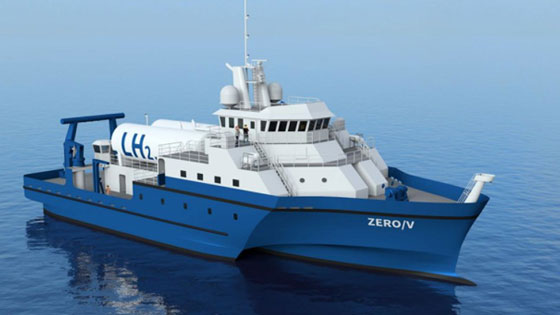Team designs zero-emissions marine research vessel

Marine research could soon be possible without the risk of polluting either the air or the ocean. All thanks to a new ship design and feasibility study led by Sandia National Laboratories. Hydrogen fuel cells have existed for decades, and there are multiple advantages to using them instead of diesel engines specifically to power research ships. Fuel cells are zero-emissions technology, so they won't contaminate air or water samples collected in sensitive ecological areas. They make almost no noise, so they won't upset marine life or interfere with the many sensors scientists use to listen to sound in the ocean.
Despite these and many other advantages, the feasibility of a hydrogen-powered research vessel has never been studied or proven. Until now. A Sandia report released this month shows it is technically and economically feasible to build such a vessel in a manner consistent with marine regulations. The project team nicknamed the vessel the "Zero-V," short for zero-emissions research vessel.
One of the biggest additional benefits of using hydrogen to power a boat? No ecologically damaging fuel spills. According to Sandia chemist and project lead Lennie Klebanoff, it is impossible to have a polluting hydrogen spill on the water. More buoyant than helium, hydrogen rises on its own and eventually escapes into outer space.
"If you're working in a sensitive ecological area and you spill liquid hydrogen there, the fuel not only removes itself from this environment, it removes itself from the planet.” Fuel cells even generate water so pure that the ship's crew can drink it (with conditioning), or use it for scientific experiments, reducing the need to desalinate seawater (which currently consumes large amounts of energy). Also, fuel cells are electrical devices, and as such, they offer a faster power response than internal combustion engines.
Hydrogen fuel cells are just as transformative a technology. They produce clean, quiet, nonpolluting power to ships while enabling superior scientific capabilities. "Building and operating the Zero-V will significantly advance U.S. marine transportation technology."

Source : https://www.sciencedaily.com/releases/2018/07/180703105904.htm

